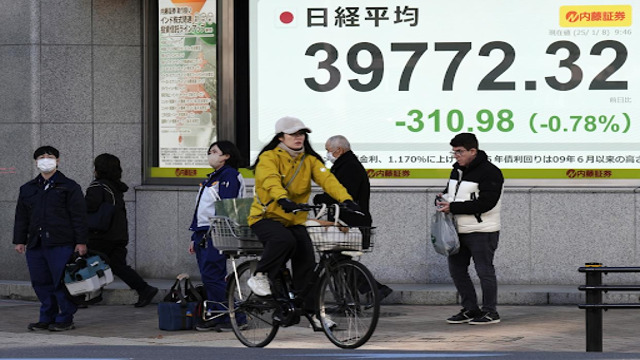
Asian stocks fell today after a decline on Wall Street, despite positive signals from the U.S. economy.
Asian stock markets faced losses on Wednesday, following a sharp decline on Wall Street. This occurred despite promising U.S. economic reports that highlighted strong job openings and business growth in December. However, concerns over rising bond yields and potential inflation dampened investor confidence.
Japan’s Nikkei 225 remained steady, closing at 40,079.09, while the yen weakened slightly against the U.S. dollar, trading at 158.19 yen. Elsewhere, Hong Kong’s Hang Seng dropped 1.6% to 19,137.88, and Shanghai’s Composite Index fell 1.5% to 3,182.49. Hong Kong-listed shares of Tencent slipped 2.1%, and battery giant CATL declined 1.4% after the U.S. linked them to China’s military activities.
South Korea's Kospi bucked the trend, climbing 1.2% to 2,522.75, and Australia’s S&P/ASX 200 rose 0.7% to 8,348.60.
On Wall Street, the S&P 500 slid 1.1% to 5,909.03, the Dow Jones lost 0.4% to 42,528.36, and the tech-heavy Nasdaq tumbled 1.9% to 19,489.68. Rising bond yields, spurred by encouraging economic reports, weighed heavily on equities.
Reports revealed that U.S. employers had more job openings than expected in November, and December’s business activity in finance, retail, and other sectors grew robustly. While these indicators reflect a resilient economy, they also raise inflation concerns, potentially influencing the Federal Reserve to reconsider further interest rate cuts.
The Fed began reducing rates in September to bolster the economy but hinted at a slower pace ahead. Market concerns over inflation persist, especially with looming policy changes under President-elect Donald Trump, including potential tariffs and tax cuts that might drive government debt and bond yields higher.
Treasury yields surged, with the 10-year yield hitting 4.69%, up from 4.63% before Tuesday’s economic data release. Higher yields make bonds more appealing, diverting investments from stocks. Analysts suggest markets are now in a phase where positive economic news is viewed negatively, as it may deter rate cuts.
Energy prices showed modest gains, with U.S. crude rising 37 cents to $74.62 a barrel and Brent Crude climbing 29 cents to $77.34 a barrel. In currencies, the euro edged up slightly to $1.0347.
This week’s focus shifts to Friday’s U.S. job market report, expected to show slower hiring growth in December, with economists predicting 156,500 new jobs.















